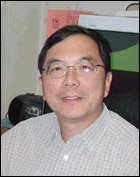Established in December 2002, this two-year collaboration totals $230,000 in funding, and brings together two leading hair follicle biologists. The Foundation announced the researchers and the consortium in January. The members are:
Angela M. Christiano, PhD (Columbia University, New York)
“We are very grateful to the Kirsch Foundation for its support of hair research. It is not often that scientists in our field have the privilege of being sponsored by such a prestigious organization. We are now in a unique position to make great strides in our work, as a direct result of this commitment.”
Colin A. B. Jahoda, PhD (Durham University, England)
“This is an outstanding opportunity to tackle a human condition that is of widespread concern for individuals and poses genuinely interesting scientific challenges. The Foundation has helped to fill a void in funding that will allow us to bring a direct and unfettered approach to the research. The collaborative element is crucial in bringing together distinctive but complementary skills and technologies, as well as beneficial individual interactions. This has to be a good way of doing science.”
This consortium funding offers the potential to build upon the results that Dr. Christiano and Dr. Colin Jahoda have achieved through their informal collaboration thus far. As a result of publicity about Dr. Jahoda’s work, there have been a number of lucrative offers to market human hair loss “cures” from commercial sources. Both Drs. Jahoda and Christiano, however, believe that developing the research for therapeutic purposes should be done on an independent scientific basis. Unfortunately, given that conventional avenues of research funding consider this to be a ‘cosmetic’ problem, few, if any funds are available. We hope that by encouraging and supporting an effective collaboration, we will add real value to the work being conducted in these laboratories and send a positive message that can be leveraged into funding from other sources.
The CHFB consortium will apply the emerging technologies of developmental biology, stem cell biology and tissue engineering to the induction of new hair follicles. The investigators have pioneered methods for the culture of hair follicle cells, and Dr. Jahoda was the first individual to demonstrate that new hair follicles can be induced to form in adult skin by implantation of cultured cells. Up to now, work has mainly been performed in animal models, and the induction of human hair follicles poses specific challenges relating to human hair follicle biology. The major focus of the CHFB is to establish that new human hair follicles can be created from cultured cells in adult human skin using transplantation techniques. The overall goal is the unequivocal demonstration that cultured human cells can induce new follicle formation and hair growth in human skin. Ultimately the hope is that the research can be used successfully to cure such conditions as premature balding and alopecia areata and offer solutions for hair loss due to chemotherapy.
 |
Serving as an advisor to the consortium is Dr. Cheng-Ming Chuong, Professor of Pathology at the University of Southern California. “Hair is the only place in the body that continues to shed and regenerate. It has a large pool of stem cells that maintains throughout our lives. It is like the fountain of youth. We need to learn how to use it. Drs. Jahoda and Christiano make up the dream team in hair biology research. Interesting new findings will emerge from this collaboration. I am thrilled that the Kirsch Foundation can support this endeavor. I am excited to see what will come out.” A sinistra: il Dr. Cheng-Ming Chuong |
The researchers are eager to move forward with their joint work. Features on the work of each investigator and updates on their progress will be provided from time to time and will be announced in the “what’s new” section of this website.
















